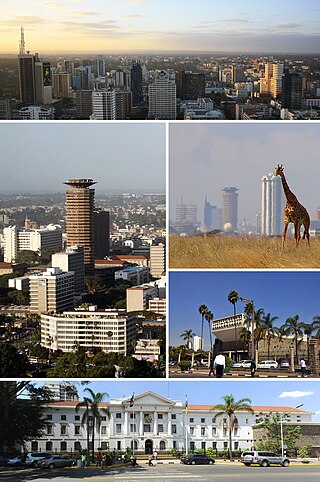
Nairobi is the capital and largest city of Kenya. The name is derived from the Maasai phrase Enkare Nairobi,which translates to 'place of cool waters',a reference to the Nairobi River which flows through the city. The city proper had a population of 4,397,073 in the 2019 census.
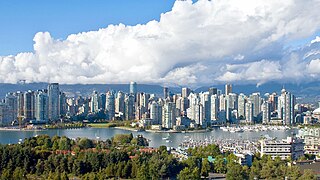
Vancouver is a major city in Western Canada,located in the Lower Mainland region of British Columbia. As the most populous city in the province,the 2021 Canadian census recorded 662,248 people in the city,up from 631,486 in 2016. The Metro Vancouver area had a population of 2.6 million in 2021,making it the third-largest metropolitan area in Canada. Greater Vancouver,along with the Fraser Valley,comprises the Lower Mainland with a regional population of over 3 million. Vancouver has the highest population density in Canada,with over 5,700 inhabitants per square kilometre (15,000/sq mi),and the fourth highest in North America.
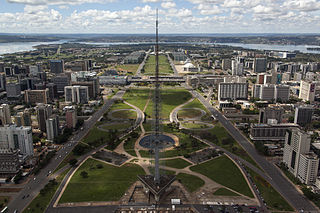
Urban design is an approach to the design of buildings and the spaces between them that focuses on specific design processes and outcomes. In addition to designing and shaping the physical features of towns,cities,and regional spaces,urban design considers 'bigger picture' issues of economic,social and environmental value and social design. The scope of a project can range from a local street or public space to an entire city and surrounding areas. Urban designers connect the fields of architecture,landscape architecture and urban planning to better organize physical space and community environments.

Jeffrey David Sachs is an American economist and public policy analyst who is a professor at Columbia University,where he was former director of The Earth Institute. He worked on the topics of sustainable development and economic development.
An eco-city or ecocity is "a human settlement modeled on the self-sustaining resilient structure and function of natural ecosystems",as defined by Ecocity Builders. Simply put,an eco-city is an ecologically healthy city. The World Bank defines eco-cities as "cities that enhance the well-being of citizens and society through integrated urban planning and management that harness the benefits of ecological systems and protect and nurture these assets for future generations". Although there is no universally accepted definition of an 'eco-city',among available definitions,there is some consensus on the basic features of an eco-city.
The Earth Institute is a research institute at Columbia University created in 1995 for addressing complex issues facing the planet and its inhabitants,with a focus on sustainable development. With an interdisciplinary approach,this includes research in climate change,geology,global health,economics,management,agriculture,ecosystems,urbanization,energy,hazards,and water. The Earth Institute's activities are guided by the idea that science and technological tools that already exist could be applied to greatly improve conditions for the world's poor,while preserving the natural systems that support life on Earth.

Richard Sennett is the Centennial Professor of Sociology at the London School of Economics and former University Professor of the Humanities at New York University. He is currently a Senior Fellow of the Center on Capitalism and Society at Columbia University. Sennett has studied social ties in cities,and the effects of urban living on individuals in the modern world.
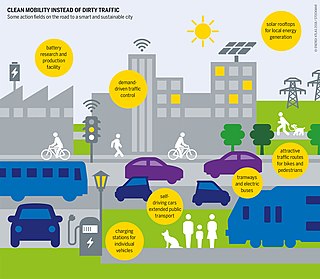
A smart city is an urban area that uses digital technology to collect data and to operate/provide services. Data can be collected from citizens,devices,buildings,or cameras. Applications include traffic and transportation systems,power plants,utilities,urban forestry,water supply networks,waste disposal,criminal investigations,information systems,schools,libraries,hospitals,and other community services. The foundation of a smart city is built on the integration of people,technology,and processes,which connect and interact across sectors such as healthcare,transportation,education,and infrastructure,etc. Smart cities are characterized by the ways in which their local governments monitor,analyze,plan,and govern the city. In a smart city,the sharing of data extends to businesses,citizens and other third parties who can derive benefit from using that data. The three largest sources of spending associated with smart cities as of 2022 were visual surveillance,public transit,and outdoor lighting.
Ongata Rongai is a town located in Kajiado North,Kajiado County,Kenya. The town is situated 17 km (10.6 mi) south of the Nairobi CBD,East of the Ngong hills,and within the greater Nairobi Metropolitan Region. It lies 1,731 meters (5,682 feet) above sea level. According to the 2019 Census,it is the most populous town in Kajiado County and eleventh largest urban centre by population in Kenya.

Bloomberg Philanthropies is a philanthropic organization that encompasses all of the charitable giving of founder Michael R. Bloomberg. Headquartered in New York City,Bloomberg Philanthropies focuses its resources on five areas:the environment,public health,the arts,government innovation and education. According to the Foundation Center,Bloomberg Philanthropies was the 10th largest foundation in the United States in 2015,the last year for which data was available. Bloomberg has pledged to donate the majority of his wealth,currently estimated at more than $54 billion. Patti Harris is the CEO of Bloomberg Philanthropies.

The World Resources Institute (WRI) is a global research non-profit organization established in 1982 with funding from the MacArthur Foundation under the leadership of James Gustave Speth. Subsequent presidents include Jonathan Lash (1993–2011),Andrew D. Steer (2012–2021) and current president Ani Dasgupta (2021–present).

Urban planning,also known as town planning,city planning,regional planning,or rural planning in specific contexts,is a technical and political process that is focused on the development and design of land use and the built environment,including air,water,and the infrastructure passing into and out of urban areas,such as transportation,communications,and distribution networks,and their accessibility. Traditionally,urban planning followed a top-down approach in master planning the physical layout of human settlements. The primary concern was the public welfare,which included considerations of efficiency,sanitation,protection and use of the environment,as well as effects of the master plans on the social and economic activities. Over time,urban planning has adopted a focus on the social and environmental bottom lines that focus on planning as a tool to improve the health and well-being of people,maintaining sustainability standards. Similarly,in the early 21st century,Jane Jacobs's writings on legal and political perspectives to emphasize the interests of residents,businesses and communities effectively influenced urban planners to take into broader consideration of resident experiences and needs while planning.

The contributions of women in climate change have received increasing attention in the early 21st century. Feedback from women and the issues faced by women have been described as "imperative" by the United Nations and "critical" by the Population Reference Bureau. A report by the World Health Organization concluded that incorporating gender-based analysis would "provide more effective climate change mitigation and adaptation."

Geeta Mehta is an Indian-American social entrepreneur,urban designer,architect and author. She is the co-founder of Asia Initiatives,and URBZ,and an adjunct professor at the Graduate School of Architecture Planning and Preservation at Columbia University.
The Urban Design Lab (UDL) is an interdisciplinary research unit of Columbia University’s Earth Institute in New York City. Established in 2005,it advances design-based solutions to issues in sustainable development and global urbanization. Richard Plunz,founder of the UDL,currently directs the program.

Carl Anthony is a social and environmental justice leader,is an American architect,regional planner,and author. He is the founding director of Urban Habitat which primarily focused on the environmental movement to confront issues of race and class structure. In addition,He is the founder and co-director of Breakthrough Communities,a project dedicated to building multiracial leadership for sustainable communities in California and the rest of the nation and was the former President of the Earth Island Institute.
Julian K. Agyeman is a professor of Urban &Environmental Policy &Planning and Fletcher Professor of Rhetoric and Debate at Tufts University. He is a co-founder and the editor-in-chief of the journal Local Environment. During his career,Agyeman has developed the concept of just sustainabilities,defined as "the need to ensure a better quality of life for all,now,and into the future,in a just and equitable manner,whilst living within the limits of supporting ecosystems."
Michele Betsill is an American political scientist. She is a professor of political science at Colorado State University,where she has also been the chair of the department. She studies climate change and sustainability policies,with a particular focus on how non-governmental actors and sub-national governments respond to climate change. She was a co-founder of the Earth System Governance Project in 2009.

Climate change and cities are deeply connected. Cities are one of the greatest contributors and likely best opportunities for addressing climate change. Cities are also one of the most vulnerable parts of the human society to the effects of climate change,and likely one of the most important solutions for reducing the environmental impact of humans. The UN projects that 68% of the world population will live in urban areas by 2050. In the year 2016,31 mega-cities reported having at least 10 million in their population,8 of which surpassed 20 million people. However,secondary cities - small to medium size cities are rapidly increasing in number and are some of the fastest growing urbanizing areas in the world further contributing to climate change impacts. Cities have a significant influence on construction and transportation—two of the key contributors to global warming emissions. Moreover,because of processes that create climate conflict and climate refugees,city areas are expected to grow during the next several decades,stressing infrastructure and concentrating more impoverished peoples in cities.
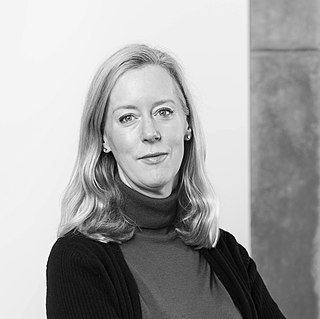
Karen Bakker was a Canadian author,researcher,and entrepreneur known for her work on digital transformation,environmental governance,and sustainability. A Rhodes Scholar with a DPhil from Oxford,Bakker was a professor at the University of British Columbia. In 2022–2023 she was on sabbatical leave at Harvard,as a Harvard Radcliffe Institute Fellow. She was the recipient of numerous awards,including a Guggenheim Fellowship,Stanford University's Annenberg Fellowship in Communication,Canada's "Top 40 Under 40",and a Trudeau Foundation Fellowship.













